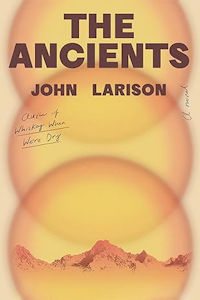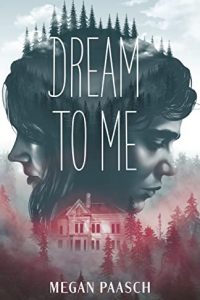The Ancients by John Larison : Review by Paul Di Filippo
 The Ancients, John Larison (Viking 978-0593831168, hardcover, 400pp, $30.00) October 2024
The Ancients, John Larison (Viking 978-0593831168, hardcover, 400pp, $30.00) October 2024
Writers from outside our genre seem to have fixed upon four major themes or topics that they find congenial to their arguably more “literary” way of writing.
Time travel. Robots and Androids. Dystopias. And Apocalypse or After the Collapse scenarios.
You don’t see many “mainstream” folks writing about, say, “talking squids in outer space,” or starship troopers or space elevators or black hole explorations. I won’t try to delve into any psychosocial reasons that might explain this uneven adoption of only certain SF tropes. Because after all, if an author not brought up in our little realm does a good job with the material, that’s all that counts.
In his second novel (after the Western historical titled Whiskey When We’re Dry), John Larison provides an outstanding, immaculate and compassionate take on what happens long after TEOTWAWKI (the end of the world as we know it). In his tale, at least nine generations (which would be roughly 250 years) and perhaps many more (given the evanescence of all major infrastructure) have passed, and the humans of this future know almost nothing of our era. This humbling perspective is one of the central lessons of Larison’s tale: each generation must live for—and must strive to improve—the present day, without immoderate devotion to past glories, or overly ambitious dreams of the future.
For most of the book, we stride along three separate tracks, until they finally all unite in Chapter XII, “Confluence.” Larison performs a neat trick with his narrative. Up until Chapter XII, each section is leisurely and long. We really dig into the different isolated sets of characters in spacious and generous stints. But after the confluence, the sections come short and choppy, as we zip around an increasingly chaotic scene, bopping from one protagonist to another. The book’s telling nicely mirrors the events.
First on stage are three children, introduced with a great fairy-tale first sentence: “Once there was a boy whose parents left to get food but didn’t come home.” Kushim is the boy, youngest of three siblings. His middle sister is Maren, and the oldest girl is Leerit. Up to the disappearance of their parents, the five of them lived in a formerly busy village by the sea. Once a thriving community, the place hollowed out when all the other inhabitants went off for literally greener pastures. This tight nuclear family was doing just okay, but with parents vanished, the kids realize they must make the migratory trek too. Maybe they can reunite with their folks—if they are still alive.
Larison fleshes out the individuality of each child wonderfully. Kushim a little scared, but trusting of his sisters. Maren a tad resentful of older sib. Leerit headstrong, brave, but hosting innumerable doubts and much responsibility. Their odyssey across the land will be full of challenges, surprises, and natural dangers. (The fact that human marauders are practically nonexistent lends a different air to the book than most apocalyptic tales, and indicates how thoroughly this “second-growth” civilization has settled into stable patterns.)
Next up, shockingly, is the mother of the children, Lilah. She and husband Tamar had been foraging on the shore when slavers came. Tamar was killed, and Lilah captured. Now, a ship takes her to an unknown fate. During the passage she becomes almost an adopted mother to two children, Koneet and Kenta. All three eventually end up in the capital city of the Empire.
And this urban locale holds our third major player, Cyrus. His father was a wool magnate and producer. Having just died, the father leaves the operation to Cyrus. A less capable businessman there seldom was. Cyrus was raised a dedicated scholar of textual scrolls. He’s also gay, which makes taking a wife and establishing a new dynasty somewhat problematical. His lover is a doctor named Ashair—who is bisexual and lovingly married to his pregnant wife. This impossible triangle will play out in unexpected ways.
Cyrus learns that the family business is almost bankrupt. He is forced to seek loans from an old family “friend,” General Rah. But the military man gives money for ulterior motives. He sees in Cyrus someone useful to him. Can you say “overthrow the Emperor?”
At the same time in the city, a massive Ark is being built. Old legends seem to point to a golden continent on the far side of the ocean, and the Emperor has promised to move every citizen there, even in multiple trips. But as usual, the elite have other plans.
The odyssey of the children is the most adventure-packed segment of the book. And, heartbreakingly, all three are eventually separated. Lilah’s duties as a wool factory slave are full of intrigue and terror, but with few melodramatic doings. Cyrus’s narrative is kind of a fusion of the other two modes: lots of interiority, but also plenty of action. And as I said, when all three strands intertwine, all hell breaks loose.
Larison’s unadorned but evocative prose confers a kind of immemorial gravitas on the telling. One gets a sense of mythic recapitulations. And at one point Larison actually falls into a kind of bardic utterance about how history works, as if we are seeing all this from a far remove. But this subtextual vibe does not interfere with the real human immediacy of all the plots. These are living and breathing people whom we come to care deeply for.
The Ancients might be compared fruitfully to both Earth Abides and Davy, with even a small taste of Engine Summer. But the subplot about the Ark invokes a predecessor from left field: Mark Geston’s cult masterpiece Lords of the Starship. The surreal focus on a mythic land across the seas and how this irrational belief drives the Ark cult is very similar to the doings in Geston’s book. It is a mark of Cyrus’s maturation that he eventually turns his back on this cult.
Larison confers a hard-won “happy ending” on all his cast, and the story ends on an upbeat note that is not often found in After the Collapse tales. Maybe you can hear Joni Mitchell singing at the end: “The seasons, they go round and round/And the painted ponies go up and down./We’re riding on a carousel of time.”
Interested in this title? Your purchase through the links below brings us a small amount of affiliate income and helps us keep doing all the reviews you love to read!
 While you are here, please take a moment to support Locus with a one-time or recurring donation. We rely on reader donations to keep the magazine and site going, and would like to keep the site paywall free, but WE NEED YOUR FINANCIAL SUPPORT to continue quality coverage of the science fiction and fantasy field.
While you are here, please take a moment to support Locus with a one-time or recurring donation. We rely on reader donations to keep the magazine and site going, and would like to keep the site paywall free, but WE NEED YOUR FINANCIAL SUPPORT to continue quality coverage of the science fiction and fantasy field.
©Locus Magazine. Copyrighted material may not be republished without permission of LSFF.








